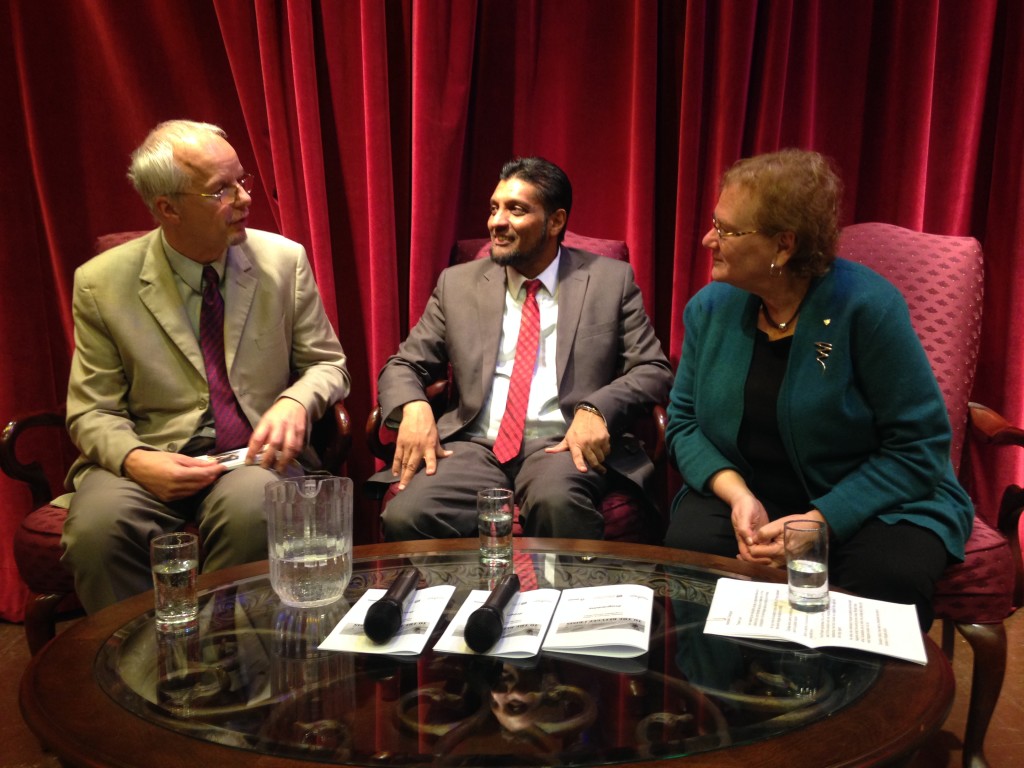Faith communities in Canada tend to play a larger role in resettling refugees than they do in many other countries, Globe and Mail international affairs columnist Doug Saunders told a Feb. 5 event on the interfaith response to the Syrian refugee crisis.
In honour of United Nations World Interfaith Harmony Week, the Intercultural Dialogue Institute of the Greater Toronto Area in collaboration with Congregation Darchei Noam, Toronto’s Reconstructionist synagogue, presented a panel on efforts by Toronto’s Jewish, Muslim and Catholic communities to sponsor and help refugees – particularly from Syria – integrate into Canadian society.
READ: MONTREAL JEWS AND MUSLIMS UNITE TO HELP SYRIAN REFUGEES
The event was held at Darchei Noam, and the audience of close to 250 people came from a cross-section of the three faith groups.
Saunders moderated a panel consisting of Naomi Alboim, professor and chair of the Policy Forum at the School of Policy Studies at Queen’s University and a public policy consultant who in 1979 was the Ontario region’s federal co-ordinator of the Indochinese Refugee movement; Habeeb Alli, member of the Canadian Council of Muslim Theologians and the Canadian Council of Imams, and a community development manager at International Development and Relief Foundation; and Martin Mark, director of the Roman Catholic Archdiocese of Toronto’s Office for Refugees.

Saunders emphasized the pivotal role Canada’s faith groups have played in various international refugee crises since the 1950s and noted that in other countries, the government often plays a more direct role in settling refugees, with faith groups being more removed.
Regarding the current Syrian refugee crisis, Saunders said Canada is tending to accept what he called the “tougher cases,” refugees who’ve been living in displacement camps in neighbouring countries rather than refugees of greater means who may have been able to pay their way to Europe. For that reason, in Canada it will “take the support of schools, communities and faith groups to make sure [the refugees] get the hand-holding they need,” Saunders added.
The panelists took turns highlighting what their communities have been doing to help the Syrian newcomers.
Alboim, who’s also a member of Darchei Noam’s Syrian refugee sponsorship committee, said Lifeline Syria, a group she helped form last June that trains and assists groups sponsoring Syrian refugees, complements the work of mostly faith-based sponsorship agreement holders who “have been working in the trenches since the late 1970s to sponsor refugees from all over the world.”
She noted that Canadian Jews were very active in sponsoring Vietnamese families in the late 1970s and early 1980s.
The Jewish community has stepped up in the current crisis, she explained, with 35 groups working under the umbrella of Jewish Immigrant Aid Services (JIAS) to form sponsorship groups, while others have formed independent sponsorship groups and some synagogues have joined mosques or churches to submit joint applications to sponsor Syrian families.
The current wave of anti-refugee and anti-Islam sentiment sweeping Europe “brings back painful memories” for us as Jews, she added, noting, “We’re responding to this crisis as Jews, because it’s the right, humanitarian thing to do, because it’s an opportunity to put our values of welcoming the stranger and tikkun olam into practice, and as [many of us are] children of refugees, we’re paying it forward.”
Alli said Canadians must come to recognize that Islam is not a hindrance to Syrian refugees’ integration into Canada.
“To those who call me and say, ‘I want to sponsor a refugee but I’m wondering if they are Sunni or Shiite,’ I say, ‘Aren’t they human beings?’’ he said, adding that Canadians must trust the government, which is screening the refugees in collaboration with the UN Human Rights Council.
READ: VANCOUVER JEWS RALLY TO HELP SYRIAN REFUGEES
Mark noted that the Catholic response to the crisis has been significant, and Catholic charities have been working on the ground in countries such as Jordan and Turkey to help displaced Syrian refugees, believing that “settlement starts overseas.”
Further, nearly one-third of the sponsorship agreement holder groups in Canada are Catholic agencies, he said.
Regarding integration, Saunders said that while Canada gives refugees “a quick pathway to permanent residence and citizenship” integration in education and employment is crucial.
“Research shows that when people have the same level of education and employment and average income as people around them, the cultural stuff becomes a lot less difficult and tends to take care of itself… the phenomenon of children falling out of the system into marginality and alienation, this often has to do with people leaving the educational system early or falling out of the employment system,” he said.
